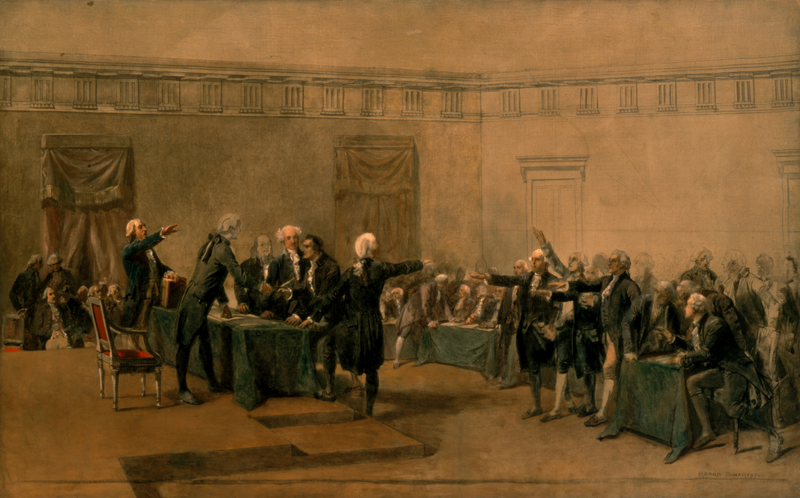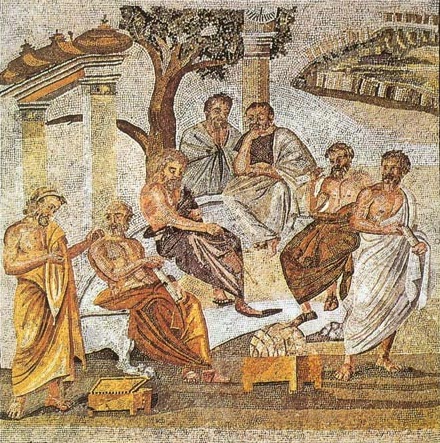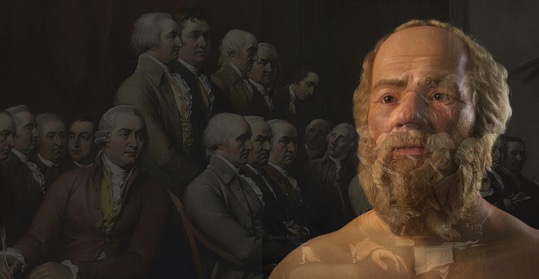Why I Joined UATX

A new university founded on truth and honesty.
In Witness, Whittaker Chambers explained his break with the Communist Party after he learned of the widespread violence and murder its ideologues were committing. As Chambers famously phrased it, he heard the screams.
I left mainstream academia because I heard the lies.
The core reason why I walked away from an established academic career to help build a new institution is that I felt the urge to censor myself. I remember thinking many times—and many of my colleagues will recognize this worry—“What will happen if I say or write what I think?” Whether it is about the right path to equality, the wrong path to racial justice, or Israel, or religion, will I hurt my career if I say what I think is true? I had often experienced the sick feeling in my stomach of knowing I was being false to my own beliefs. And I had talked to too many colleagues who felt the same disgust but didn’t see a path out of it.
Many of the lies that professors tell themselves and others emanate from the DEI office, which claims to promote “Diversity, Equity, and Inclusion.” Those ideas sound better in theory than they look in practice.
Most Americans and many academics believe that equality—not “equity”—is the right value, though to say so on campus will invite trouble. I believe deeply in equality: the necessity of treating all individuals the same regardless of race or creed, recognizing them as individuals rather than avatars of their identity group. Equity, by contrast, mandates that public and private institutions violate the principle of equal treatment to make sure that groups do not experience different outcomes. So when influential decisions are made about selection or promotion, the decision-makers must pick the groups to be given an advantage, after placing each person into their identity box.
Putting individuals into an identity category as the primary way of evaluating them is inherently wrong and dehumanizing. It also creates perverse incentives to misrepresent membership in the favored categories, from blue-eyed Native Americans, to “Hispanics” who don’t speak Spanish but might have a grandmother from Central America, and Asians who attempt to appear less Asian in order to boost their chances of admission. (In the recent proceedings at the Supreme Court, Harvard openly lied about its discrimination against Asians, leading to the ruling against them.)
I have come to think of DEI as standing for Dishonesty, Exclusion, and Ideology. Dishonesty about the process of choosing students and hiring faculty (if one must hide the procedures followed behind closed doors, are they really legitimate?). The exclusion of those who dispute campus orthodoxy. And advancing an ideology of oppressor vs. oppressed, with racism, hatred, and unearned advantage as the only important explanatory variables.
DEI advances the broader ideology of identity authoritarianism, more commonly called wokeness or wokeism, which has come to dominate campus life. It asserts that whites, men, straight people, and Americans have always been—and always will be—the oppressors. Blacks, women, some non-white minorities (but not all), non-straights, and those from non-Western nations will always have a claim to greater moral standing and more resources. There are no such things as overperforming or underperforming groups, but only oppressors and oppressed.
When a hiring committee knows they have not chosen the number one candidate on their list and have instead made a demographic decision but say publicly they have chosen the most qualified person, is that the same kind of lie as “You look like you’ve lost weight” or “I will consider that proposal”? In other words, is it a white lie with little downstream consequence, or is it a corrupting lie with large negative effects? There is broad disagreement about the answer to that question. Some favor the white lie side while others favor honesty but face strong incentives to go along with the lies.
Over the past years I have come to believe that over time those lies corrupt the minds of those who say them. Those lies, even when the people promoting them believe they are for the greater good, create a university culture that accepts coercion and lying in a widening circle of behaviors that includes plagiarism and falsification of research. It is one thing to lie in private over something small. But it’s something soul-destroyingly different for scholars devoted to truth-seeking and truth-teaching to be coerced into lying in public by their own institutions, especially while many of their students know them to be lying.
Many Americans working outside of academia are surprised to learn that in order to be considered for a faculty job, candidates usually have to write an essay supporting the goals of DEI, even if they do not think equity is the right value or that DEI policies are the best approach. In most cases, a professor who does not participate in this exercise will not be considered. The coercion is open, and misrepresentation is prevalent.
I also suspect that most Americans have not traced the crooked line between the DEI office and the recent encampments on campuses in the wake of Hamas’s October 7 attack. The deeply questionable views propagated by identity authoritarianism have led to the conclusion that just as the groups experiencing worse outcomes should be righteously indignant about their undeserved oppression, overperforming groups should be openly hated for their undeserved success. Any group whose members make great contributions to society through an ethic of work and a cultivation of talent such as Jews can expect to be branded as thieves rather than achievers.
This explains why the new ideology is inherently anti-Semitic. DEI promotes the great lie that Jews are the oppressors rather than the oppressed, meaning that anti-Semitism has been appropriated as a form of social justice. The rising power of the identity authoritarians on campus was always going to lead directly to the kind of open antagonism toward Jews we see today.
I believe we should call out these lies. Now is the time to speak honestly. Now is the time for new institutions.
The University of Austin was founded by a group of intellectuals who insist on open inquiry and civil discourse. The faculty at UATX say what we think. We no longer listen to parrots with more titles than morals. At the University of Austin, no one will be shouted down, no student will look around twice before suggesting an idea, and no professor will fear for his career if he says something unpopular. Why? Because our commitment to principle is not left to individuals but is instead built into the very structure of the institution itself.
UATX is the first American university governed by a written constitution that is enforced against its own administration. This founding document—modeled on the U.S. Constitution—explicitly protects academic liberty. It also mandates that all admission and hiring decisions be made “without regard to race, gender, sexual orientation, political affiliation, or religious faith.” Most importantly, it introduces an enforcement mechanism: a constitutional court whose rulings bind the administrators. If any professor or student believes their rights have been violated or a university rule not followed, they can bring the case directly to the court, whose judges—all from outside UATX—are free to rule against the school.
The first time this court orders the university to reverse a decision made by its administration will be a signature moment of the history of American academia. That will be a day of celebration for believers in the mission of UATX, a Marbury v. Madison moment of institutional success.
Solzhenitsyn famously explained how living by lies corrupts every individual. We cannot learn by lies. Nor can we build with lies, or we will watch institutions crumble, as they are doing now. One of the faculty at UATX asked the deans to describe the new school in one word. I said “free.” Another dean said “honest.” His rendition is better, because honesty—to yourself as well as others—is the path to a free life as well as a free campus.
My colleagues and I now share something with Whittaker Chambers, struggling through ideological webs that ensnare us and conceal truths. But we see and hear what is going on, and we can admit it to ourselves. Chambers believed he was leaving the winning side for the losing side but did it anyway. His side had a longer life than he anticipated. Our odds are much better, our price paid for liberty far smaller, and our reasons to continue to go along with orthodoxy far weaker.
In a place where all who contribute to civil discourse are welcomed and none are silenced, a true kind of university will flourish. I am staking my claim that such a university was founded in Austin.
The American Mind presents a range of perspectives. Views are writers’ own and do not necessarily represent those of The Claremont Institute.
The American Mind is a publication of the Claremont Institute, a non-profit 501(c)(3) organization, dedicated to restoring the principles of the American Founding to their rightful, preeminent authority in our national life. Interested in supporting our work? Gifts to the Claremont Institute are tax-deductible.
On campus, today's forlorn meritocrats no longer believe what the apparatchiks are teaching them.
Libertarianism again fails natural right.





